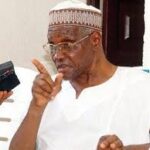
Daily Trust: How will you assess the bilateral relations between Nigeria and Sudan?
Ambassador Ibrahim Bushra: One might say the relationship between Nigeria and Sudan is a long standing and deeply-rooted history. As a matter of fact, it is a unique relationship as the two countries do not share border. Yet, blood relations, as evidenced by the millions of Sudanese people of Nigerian origin, convey the strong social and cultural bonds between the two countries. In the past, pilgrims from Nigeria seeking to perform the hajj would trek all the way to Hijaz, crossing through Sudan. Many of those making their way back from the holy trip would settle and intermarry with the locals, given the long distance. That is how we now have approximately over five million Sudanese of Nigerian origin in the Sudan.
DT: How would you assess economic cooperation between both countries?
Amb. Bushra: Economic relationship between the two countries regrettably falls far below our expectations. It is quite important to establish a robust economic cooperation to enhance sustainable development. Our countries need to invest in economic projects that would benefit both, and there are many opportunities at hand since both countries share common grounds. For instance, the climate in some parts of Nigeria is similar to that of Sudan. In terms of agriculture, we can benefit from the experiences of each other and perhaps engage in large scale trading of crops. Recently, Nigeria commenced an agricultural project with the government of Morocco that has resulted in the reduction of fertilizer prices by up to 30%. This undoubtedly has served as an incentive for Nigerian farmers, ensuring increased production. Sudan and Nigeria can engage in such projects as both countries have abundance of arable land.
In another venue, it is worth mentioning that thousands of Nigerian students seek to study in universities in Sudan. When you ask them or their parents why they made such a choice they would tell you Sudan is akin to their second home. Both countries need to work closely to reap the economic benefits of this phenomenon. It would also be pertinent, in this regard, to mention that the Embassy of Sudan in collaboration with authorities in the two countries is preparing to organize a forum on university education between the two countries, but we hope it would also spur interest in economic matters.
DT: How would you describe Nigeria’s role in the Sudanese peace process?
Amb. Bushra: We believe Nigeria’s role is quite important, as it is a testament to the level of cooperation between the two countries in tackling security issues mainly in the area of counter terrorism. We are also thankful for the Nigerian contingency in Darfur for the effort it has taken to ensure peace and stability in that area.
DT: 44 African countries recently signed the Continental Free Trade Agreement which aims to boost intra-African trade. But some countries, including Nigeria and South Africa, withheld their signatures. What is your view on this?
Amb. Bushra: The AfCFTA is a step ahead for the African continent and is a step in the right direction in achieving true unity between African countries, and perhaps it is the answer to increasing economic cooperation between us, what we have discussed earlier. This agreement holds a lot of potentials, it will facilitate trade across the continent and provide business opportunities for the youth. That being said, the fact that some countries like Nigeria preferred not to sign at the current time indicates that perhaps there are some further consultations to be made before making a commitment. It, however, does not necessarily mean that it has completely withdrawn from the agreement. The economic and security implications of the agreement differ for each country and it is understandable that careful consideration needs to be taken.
DT: Insecurity is one of the major challenges on the continent. What do you think should be done about it?
Amb. Bushra: Like Nigeria, Sudan is facing security challenges in specific areas in South Kordofan and Blue Nile states. Sudan believes that such problems are best solved through dialogue and as such the government has worked to convince the different rebel factions to sign a peace accord under the auspices of the African Union. We believe that the signing of this peace agreement will bring peace to the region. Similarly, we appreciate the tremendous effort by President Muhammadu Buhari in combating Boko Haram and we are ready to cooperate with Nigeria to tackle terrorism through any means necessary.
DT: What is the population of Nigerians in Sudan?
Amb. Bushra: Currently, we have over 5,000 Nigerian students studying at various universities in Sudan. When you factor in the Sudanese people of Nigerian origin, you may say we have over five million Sudanese of Nigerian origin in Sudan.
DT: Having been in Nigeria for so long, what is your impression?
Amb. Bushra: We find Nigerians to be polite, disciplined and hardworking people. As mentioned earlier, we share many cultural values and social norms. We are very much alike. Therefore, we are blood brothers and sisters and we hope that the relations between us continue to prosper forever.
DT: How would you like to be remembered when you leave Nigeria?
Amb. Bushra: As messengers from our countries, we work diligently to enhance relations with other countries. We consider Nigeria a part of our home and it is quite surprising to know that some people in both Sudan and Nigeria are not aware of this special relationship. We aspire to bridge the physical distance between us by raising the awareness of these people to a level that we will both be comfortable with. If we can achieve that, we are happy.

 Join Daily Trust WhatsApp Community For Quick Access To News and Happenings Around You.
Join Daily Trust WhatsApp Community For Quick Access To News and Happenings Around You.


